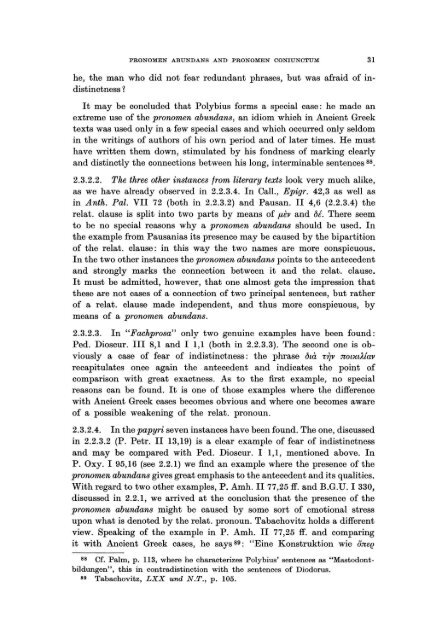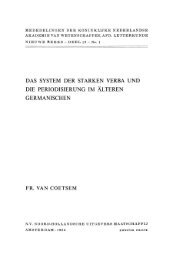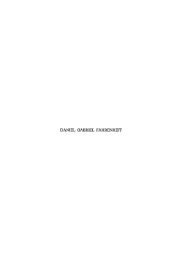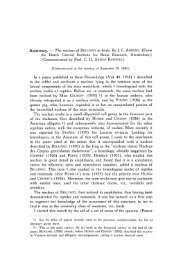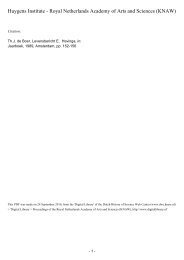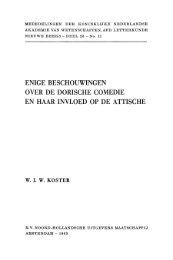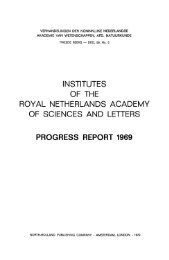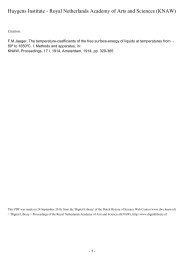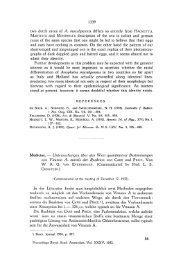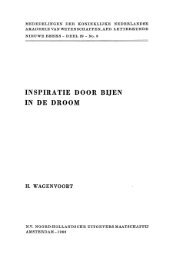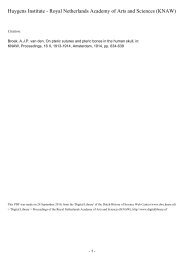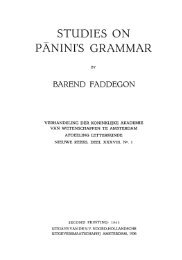Pronomen Abundans and Pronomen Coniunctum. A ... - DWC
Pronomen Abundans and Pronomen Coniunctum. A ... - DWC
Pronomen Abundans and Pronomen Coniunctum. A ... - DWC
Create successful ePaper yourself
Turn your PDF publications into a flip-book with our unique Google optimized e-Paper software.
PRONOMEN ABUNDANS AND PRONOMEN CONIUNCTUM 31<br />
he, the man who did not fear redundant phrases, but was af raid of indistinctness<br />
?<br />
It may be concluded that Polybius forms a special case: he made an<br />
extreme use of the pronomen abundans, an idiom which in Ancient Greek<br />
texts was used only in a few special cases <strong>and</strong> which occurred only seldom<br />
in the writings of authors of his own period <strong>and</strong> of later times. He must<br />
have written them down, stimulated by his fondness of marking clearly<br />
<strong>and</strong> distinctly the connections between his long, interminabIe sentences 88.<br />
2.3.2.2. The three other instanees trom literary texts look very much alike,<br />
as we have already observed in 2.2.3.4. In CaU., Epigr. 42,3 as weIl as<br />
in Anth. Pal. VII 72 (both in 2.2.3.2) <strong>and</strong> Pausan. II 4,6 (2.2.3.4) the<br />
relat. clause is split into two parts by means of flèv <strong>and</strong> bi. There seem<br />
to be no special reasons why a pronomen abundans should be used. In<br />
the example from Pausanias its presence may be caused by the bipartition<br />
of the relat. clause: in this way the two names are more conspicuous.<br />
In the two other instances the pronomen abundans points to the antecedent<br />
<strong>and</strong> strongly marks the connection between it <strong>and</strong> the relat. clause.<br />
It must be admitted, however, that one almost gets the impression that<br />
these are not cases of a connection of two principal sentences, but rather<br />
of arelat. clause made independent, <strong>and</strong> thus more conspicuous, by<br />
means of a pronomen abundans.<br />
2.3.2.3. In "Fachprosa" only two genuine examples have been found:<br />
Ped. Dioscur. III 8,1 <strong>and</strong> I 1,1 (both in 2.2.3.3). The second one is obviously<br />
a case of fear of indistinctness : the phrase &à T~V 7WtUtAtav<br />
recapitulates once again the antecedent <strong>and</strong> indicates the point of<br />
comparison with great exactness. As to the first example, no special<br />
reasons can be found. It is one of those examples where the difference<br />
with Ancient Greek cases becomes obvious <strong>and</strong> where one becomes aware<br />
of a possible weakening of the relat. pronoun.<br />
2.3.2.4. In the papyri seven instances have been found. The one, discussed<br />
in 2.2.3.2 (P. Petr. II 13,19) is a clear example of fear of indistinctness<br />
<strong>and</strong> may be compared with Pedo Dioscur. I 1,1, mentioned above. In<br />
P. Oxy. I 95,16 (see 2.2.1) we find an example where the presence of the<br />
pronomen abundans gives great emphasis to the antecedent <strong>and</strong> its qualities.<br />
With regard to two other examples, P. Amh. II 77,25 ff. <strong>and</strong> B.G.U. I 330,<br />
discussed in 2.2.1, we arrived at the conclusion that the presence of the<br />
pronomen abundans might be caused by some sort of emotional stress<br />
upon what is denoted by the relat. pronoun. Tabachovitz holds a different<br />
view. Speaking of the example in P. Amh. II 77,25 ff. <strong>and</strong> comparing<br />
it with Ancient Greek cases, he says 89: "Eine Konstruktion wie one(!<br />
88 Cf. Palm, p. 113, where he characterizes Polybius' sentences as "Mastodontbildungen"<br />
, this in contradistinction with the sentences of Diodorus.<br />
89 Tabachovitz, LXX und N.T., p. 105.


